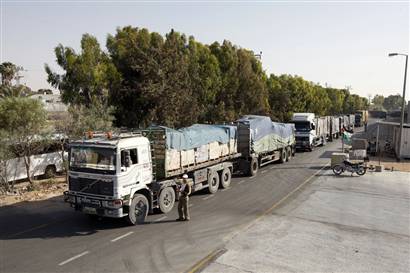In the wake of the flotilla controversy, Israelis resoundingly back their government’s stance on Gaza.
The contours of the response to the Gaza flotilla fiasco are now coming into sharper public view: the Israeli government will significantly ease the blockade of Gaza in exchange for American support for a whitewash of the investigation of the flotilla incident. As I’ve said many times on Twitter, this is a good deal. No investigation was ever going to produce anything of any particular value, but easing the blockade of Gaza could have significant positive effects for the people of Gaza, the prospects of Palestinian reconciliation, the peace process, and American credibility in the region. None of those will happen on their own, of course. And nobody is likely to be fully satisfied with the new measures. I’ve been quite critical of how the Obama team has handled the Israeli-Palestinian track, and particularly the Gaza situation — and if they had moved strongly to resolve the Gaza blockade a year ago, the issue wouldn’t have been there now to exploit. But now, I think they deserve some real credit for nudging Israel towards finally making a move which could over time open up some real new possibilities for progress.
I know a lot of people won’t agree with me on this, but trading off the investigation for the blockade was the right move. It is difficult to imagine what value even a real, independent international investigation of the flotilla incident would possibly have. The incident itself was only a minor one in the longer, deeper story of the Gaza blockade — a fiasco waiting to happen, not a bolt from the blue. An investigation narrowly focused on the flotilla and what happened during the Israeli boarding would be of only marginal value, while the process itself would be hopelessly politicized. The Israeli self-study seems designed to be self-discredting. By appointing David Trimble, founder of a “Friends of Israel” group, as one of the two international observers, they have more or less guaranteed that the results will be pleasing to their sympathizers and totally discredited in the eyes of everyone else. So be it.
Gaza itself has always been the point for most people, not the flotilla itself. Israel’s blockade of Gaza has long been widely recognized as a failure, harming the people of Gaza while strengthening Hamas and serving as a focal point for international anger. Hawks will complain that this is the wrong time to ease the blockade because it will allow Hamas to claim a victory, but that’s a weak argument — Israel, and the United States, have had many long months to ease the blockade on their own terms and have refused. Without a forcing incident, it was clear that nothing would change. But change was clearly needed.
Obama could have taken office and forced the issue of the Gaza blockade as a way of demonstrating real change from the Bush administration, and in the aftermath of the Israeli war against Gaza this would likely have commanded widespread international support. But for whatever reason, the Obama administration chose to continue the Bush administration’s policy of focusing on the Ramallah-based Palestinian Authority and excluding Hamas. Secretary of State Clinton’s promises of some $900 million in U.S. aid for Gaza at Sharm el-Sheikh in March 2009 amounted to little on the ground … an early, and still tragic, instance of the pattern of promises without delivery on these issues.
That’s the past. The Obama administration now deserves credit for focusing on Gaza and helping to convince the Netanyahu government to make substantial changes to the Gaza blockade. The emerging system seems likely to shift from a system which kept out a vast and bewildering array of goods and products to one with a much more tightly defined black list of items with military applications. A much wider range of food and materials should now be able to enter, allowing for greater rebuilding and a more normal life — ideally, while also reducing the near-complete dependence of Gazans on the Hamas-controlled tunnel smuggling trade. It’s not the full lifting of the blockade which many have demanded, but it’s still a significant change — one that sort of reminds me of the attempt to create “smart sanctions” on Iraq back in 2001, as the U.S. came to recognize that the old sanctions regime had almost totally collapsed, and only served to strengthen Saddam’s regime. Much will depend on how the new system is implemented, something about which past experience isn’t reassuring, but this is still a significant change which shouldn’t be dismissed out of hand.
To get the most out of this move, it should only be the first step. The UN, NGOs, and the international community should take advantage of the new system to begin serious reconstruction and development efforts. The distribution of the goods should be done in such a way as to break the Hamas monopoly, but not explicitly as an anti-Hamas weapon. New efforts should be made to revive Hamas-Fatah reconciliation talks to try to restore some semblance of a unified Palestinian entity (current signs are not promising, as the Egyptian foreign minister continues to take a hard line). A serious strategic communications campaign should try to convince Palestinians and Arabs that the U.S. has finally delivered something of substance on an issue they care about. And this then should be used to jump-start peace talks from a more positive position. All tall orders, I know — but it’s so unusual to actually have some positive, forward momentum on key issues, and to have the Obama administration helping to deliver on something important in this arena, that now is a time for a rare flash of optimism.
